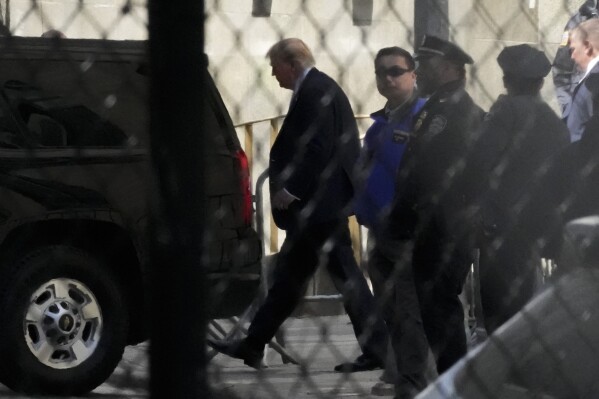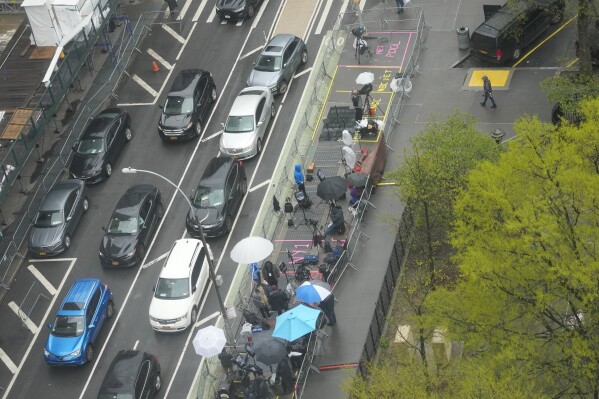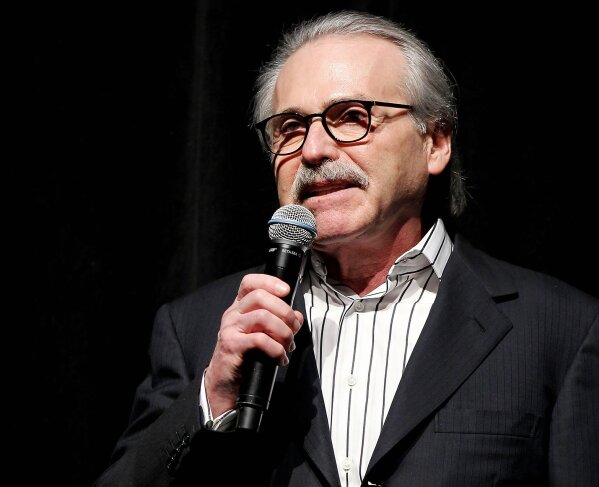Live
Trump trial live updates: Testimony set to resume in hush money case
The AP is live outside Trump Tower as David Pecker, a longtime tabloid publisher, is expected to tell jurors about his efforts to help Donald Trump stifle unflattering stories during the 2016 campaign as testimony resumes in the historic hush money trial of the former president.
Published [hour]:[minute] [AMPM] [timezone], [monthFull] [day], [year]
Updated [hour]:[minute] [AMPM] [timezone], [monthFull] [day], [year]
As testimony resumes in Donald Trump’s hush money trial, longtime tabloid publisher David Pecker is expected to take the stand again, telling jurors about his efforts to help the former president stifle unflattering stories during the 2016 campaign. Court is in session at 9:30 a.m. ET.
Here’s what to know:
- What the case is about: Trump is charged with 34 felony counts of falsifying business records as part of a scheme to bury stories that he feared could hurt his 2016 campaign.
- What was said in opening statements: The prosecution argued that Trump’s hush money payments were mislabeled as legal services. The defense said Trump had nothing to do with the payments.
- Why the trial isn’t televised: New York state law regarding media coverage of court proceedings is one of the most restrictive in the country, but some reporters, including from the AP, are allowed inside the courtroom.
In case you missed it: Trump’s $175 million bond in his civil fraud case was settled with a cash promise

Former President Donald Trump, center, leaves Manhattan criminal court, Monday, April 22, 2024, in New York. (AP Photo/Mary Altaffer)
New York state lawyers and an attorney for former President Donald Trump settled their differences Monday over a $175 million bond that Trump posted to block a large civil fraud judgment while he pursues appeals.
The agreement cut short a potential day-long court hearing in Manhattan that was to feature witnesses.
As part of a deal struck during a 20-minute recess, lawyers for Trump and Knight Specialty Insurance Company agreed to keep the $175 million in a cash account that will gain interest but faces no downside risk. The account so far has grown by over $700,000.
The bond stops the state from potentially seizing Trump’s assets to satisfy the more than $454 million that he owes after losing a court case brought by the Democratic attorney general. She had alleged that Trump, along with his company and key executives, defrauded bankers and insurers by lying about his wealth.
The ex-president and presumptive Republican nominee denies the claims and is appealing the judgment.
▶ Read more about Trump’s bond settlement.
Two journalists have been expelled for breaking the rules

Television crews are set up across the street from Manhattan criminal court before the start of former President Donald Trump’s trial, Thursday, April 18, 2024 in New York. (AP Photo/Mary Altaffer, Pool)
Two journalists covering the trial have been removed and expelled for breaking rules prohibiting recording and photography in the overflow room, where reporters who can’t get into the main courtroom watch the proceedings on large screens, according to court officials.
One of the banned journalists had previously been warned for violating the rules during jury selection.
Uniformed court officers have been making daily announcements reminding reporters of the rules. Signs posted in the overflow room and around the courthouse make clear that photography and recording are not allowed.
▶ Read more about how journalists are covering a trial that can’t be televised.
WATCH: Prosecutors allege Trump tried to ‘corrupt’ the 2016 election
The start of opening statements in Donald Trump’s hush money trial set the stage for weeks of testimony about the former president’s personal life and places his legal troubles at the center of his closely contested campaign against President Joe Biden.
Opening statements offered a clear picture of Trump’s defense
Trump’s attorney used his opening statement to attack the case as baseless, saying the former president did nothing illegal.
The attorney, Todd Blanche, challenged prosecutors’ claim that Trump agreed to pay Daniels to aid his campaign, saying Trump was trying to “protect his family, his reputation and his brand.”
Blanche indicated the defense will argue that after all the very point of a presidential campaign is to try to influence an election.
“It’s called democracy,” Blanche told jurors. “They put something sinister on this idea, as if it was a crime. You’ll learn it’s not.”
Blanche also portrayed the ledger entries at issue in the case as pro forma actions performed by a Trump Organization employee. Trump “had nothing to do with” the allegedly false business records, “except that he signed the checks, in the White House, while he was running the country,” Blanche said.
And he argued that the records’ references to legal expenses weren’t false, since Cohen was Trump’s personal lawyer at the time.
▶ Read more takeaways from the opening statements.
‘Election fraud’ vs. a ‘bookkeeping case’
Republican presidential candidate and former U.S. President Donald Trump walks next to his attorney Todd Blanche, at Manhattan state court in New York, Monday, April 22, 2024. (Brendan McDermid/Pool Photo via AP)
Trump is charged with 34 counts of falsifying internal Trump Organization business records. But prosecutors made clear they do not want jurors to view this as a routine paper case.
Prosecutor Matthew Colangelo said the heart of the case is a scheme to “corrupt” the 2016 election by silencing people who were about to come forward with embarrassing stories Trump feared would hurt his campaign.
“No politician wants bad press,” Colangelo said. “But the evidence at trial will show that this was not spin or communication strategy. This was a planned, coordinated, long-running conspiracy to influence the 2016 election, to help Donald Trump get elected through illegal expenditures to silence people who had something bad to say about his behavior.”
He added: “It was election fraud, pure and simple.”
Prosecutors’ characterizations appear designed to combat suggestions by some pundits that the case — perhaps the only one that will go to trial before the November election — isn’t as serious as the other three prosecutions he’s facing. Those cases accuse Trump of trying to overturn the 2020 election he lost to President Joe Biden and illegally retaining classified documents after he left the White House.
Trump, meanwhile, sought to downplay the accusations while leaving the courtroom on Monday, calling it all a “bookkeeping” case and “a very minor thing.” But he, too, has said it’s all about an election — the one this November. Trump has repeatedly claimed that the case is part of a sweeping Democratic attempt to harm his chances at reclaiming the presidency.
▶ Read more takeaways from the opening statements.
Pecker’s turn on the stand Monday was mostly about his background
Former National Enquirer publisher David Pecker is the first witness for prosecutors, who say that Trump’s alleged scheme to conceal potentially damaging information from voters began with a 2015 Trump Tower meeting among the then-candidate, Pecker and Trump lawyer Michael Cohen.
At the meeting, Pecker — a longtime Trump friend — agreed to aid Trump’s campaign by running favorable pieces about him, smearing his opponents, scouting unflattering stories about him and flagging them to Cohen for “catch-and-kill” deals. Those included the claims made by Daniels, McDougal and the former Trump Tower doorman, Dino Sajudin, prosecutors say. Trump says all were false.

FILE – David Pecker, chairman and CEO of American Media, speaks at an event, Jan. 31, 2014 in New York. Pecker is The National Enquirer’s former publisher and a longtime friend of Donald Trump. Prosecutors say he met with Trump and Trump’s former lawyer Michael Cohen at Trump Tower in August 2015 and agreed to help Trump’s campaign identify negative stories about him. (Marion Curtis via AP, File)
Pecker will likely be asked about all the alleged efforts made by the Enquirer’s then-owner, American Media Inc., on Trump’s behalf. Federal prosecutors agreed in 2018 not to prosecute American Media in exchange for its cooperation in a campaign finance investigation that led to Cohen’s guilty plea, and the Federal Election Commission fined the company $187,500, calling the McDougal deal a “prohibited corporate in-kind contribution.”
Pecker’s brief turn on the stand Monday was mainly just about his background and other basic facts, though he did say the Enquirer practiced “checkbook journalism” — paying for stories — and that he had the final say on any story about a famous person.
▶ Read more takeaways from Monday’s opening statements.
Need a recap of what was said during opening statements? Start here
Donald Trump tried to illegally influence the 2016 presidential election by preventing damaging stories about his personal life from becoming public, a prosecutor told jurors Monday at the start of the former president’s historic hush money trial.
“This was a planned, coordinated, long-running conspiracy to influence the 2016 election — to help Donald Trump get elected through illegal expenditures to silence people who had something bad to say about his behavior, using doctored corporate records and bank forms to conceal those payments along the way,” prosecutor Matthew Colangelo said. “It was election fraud, pure and simple.”
A defense lawyer countered by assailing the case as baseless and attacking the integrity of the onetime Trump confidant who’s now the government’s star witness.
“President Trump is innocent. President Trump did not commit any crimes. The Manhattan district attorney’s office should never have brought this case,” attorney Todd Blanche said.
The opening statements offered the 12-person jury — and the voting public — radically divergent roadmaps for a case that will unfold against the backdrop of a closely contested White House race in which Trump is not only the presumptive Republican nominee but also a criminal defendant facing the prospect of a felony conviction and prison.
▶ Read more about what was said during opening statements.
Testimony set to resume in Trump’s hush money case
Witness David Pecker, far right, talks on the witness stand while Donald Trump, far left, looks on as assistant district attorney Joshua Steingless asks questions with Judge Juan Merchan presiding in Manhattan criminal court Monday, April 22, 2024, in New York. (Elizabeth Williams via AP)
A longtime tabloid publisher is expected Tuesday to tell jurors about his efforts to help Donald Trump stifle unflattering stories during the 2016 campaign as testimony resumes in the historic hush money trial of the former president.
David Pecker, the former National Enquirer publisher who prosecutors say worked with Trump and Trump’s lawyer, Michael Cohen, on a strategy to buy up and then spike negative stories during the campaign, testified briefly on Monday and will be back on the stand Tuesday in the Manhattan trial.
Also Tuesday, prosecutors are expected to tell a judge that Trump should be held in contempt over a series of posts on his Truth Social platform that they say violated an earlier gag order barring him from attacking witnesses in the case. Trump’s lawyers deny that he broke the order.
Court is scheduled to resume at 9:30 a.m. ET.

